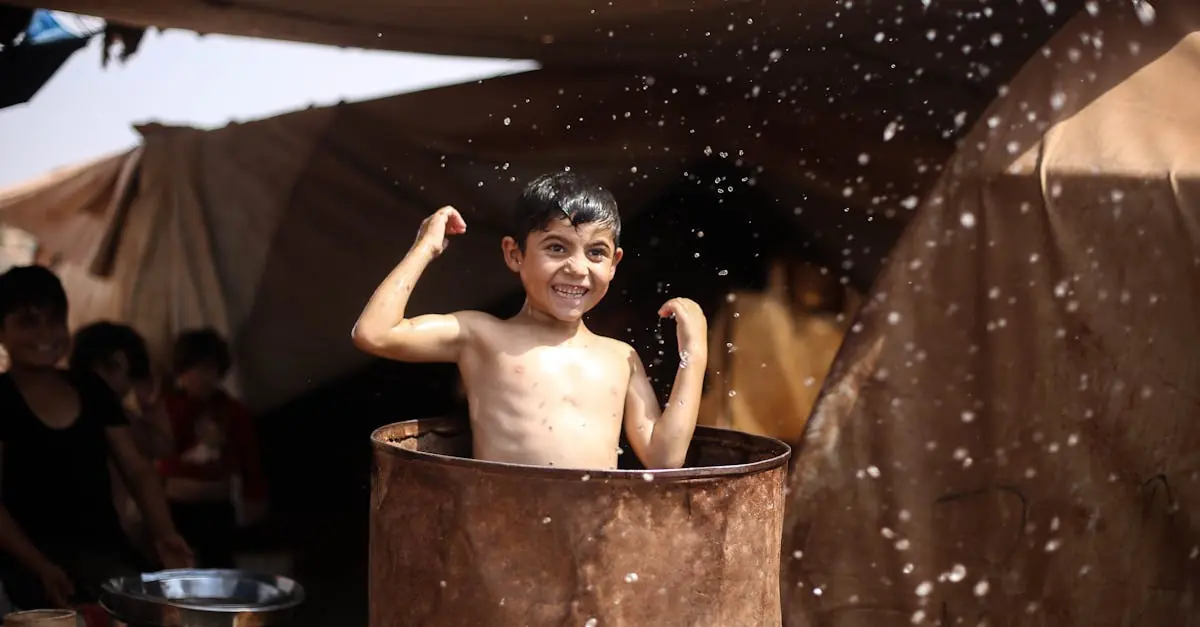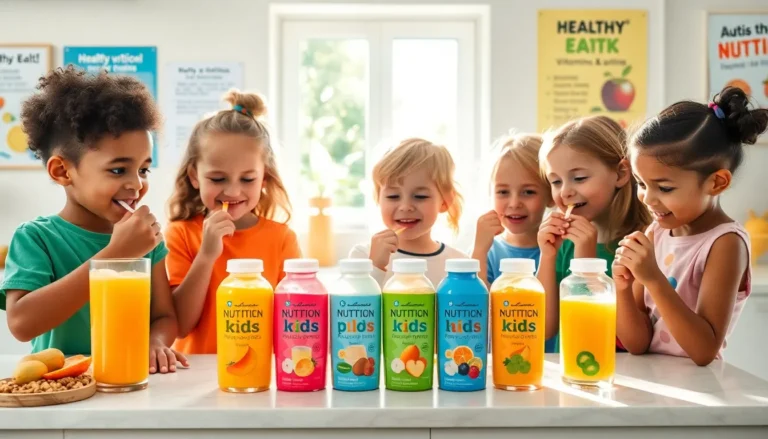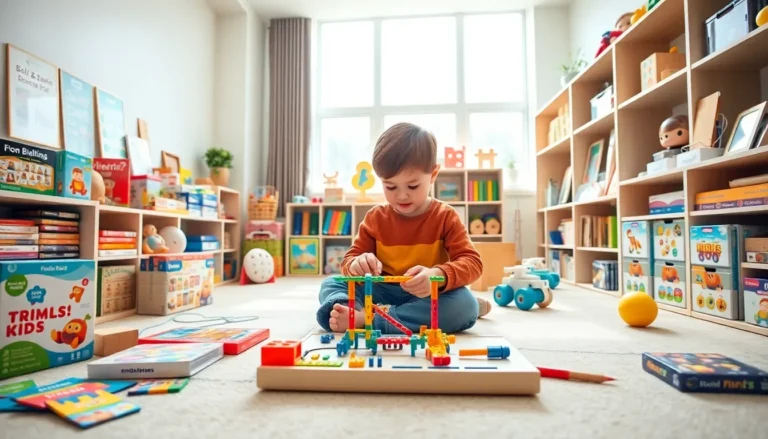Summer’s just around the corner, and for many kids, that means one thing: camp! Picture this: a world filled with laughter, new friendships, and the sweet smell of s’mores wafting through the air. Kids are ready to trade in their screens for sun-soaked adventures and unforgettable memories. But let’s be honest, sending your little one off to their first summer camp can feel like a rite of passage – for both kids and parents.
Table of Contents
ToggleKids First Summer Camp: An Overview
Kids experience excitement as they embark on their first summer camp adventure. Camp programs typically focus on outdoor activities, arts and crafts, and teamwork. Parents often face mixed emotions when sending their children away, feeling both anticipation and anxiety.
Activities at summer camps vary widely. Swimming and hiking allow children to explore nature, while team sports promote cooperation and social skills. Creative workshops like pottery or painting encourage self-expression and discovery. Camps often emphasize safety, ensuring facilities maintain high standards for child welfare.
Social interactions play a crucial role in camp experiences. Friendships formed at camp can last a lifetime. Kids learn to navigate new relationships, fostering independence and confidence. Counselors typically guide campers, providing support and mentorship.
Parents contribute to the pre-camp process by preparing their children. Packing appropriate clothing, personal items, and comforting belongings helps kids feel secure. Familiar routines and open discussions about camp can ease transition anxiety.
Every camping experience differs. Some camps focus on specific themes like science or music, while others offer a mix of activities. Researching various options enables parents to find the best fit for their kids.
First-time summer camp presents a myriad of opportunities for children. Camp enriches lives through adventure, learning, and camaraderie. As anticipation builds for the summer adventure, families prepare for a memorable experience.
Preparing for Camp
Preparation plays a crucial role in ensuring a successful camp experience. Parents can aid their children by addressing both practical and emotional aspects.
Packing Essentials
Packing essentials enhances comfort and readiness. Clothes should include weather-appropriate items such as lightweight shirts, sturdy shoes, and swimwear. Toiletries like toothbrushes, sunscreen, and insect repellent help maintain hygiene. A reusable water bottle keeps kids hydrated during activities. Include a sleeping bag and pillow for a cozy night’s sleep. Encourage kids to bring items like books or journals for quiet moments. Personal favorites, such as stuffed animals or photos, can provide emotional support, making adjustments easier.
Emotional Readiness
Emotional readiness supports young campers in managing anticipation and anxiety. Discussing camp experiences beforehand prepares children for what to expect, fostering a sense of familiarity. Role-playing scenarios, like interacting with counselors or making new friends, builds confidence. Parents can reassure children that feeling nervous is normal, normalizing their emotions. Encouraging open conversations about fears or excitement helps children process their feelings. Local camps often involve short trial sessions, easing the transition into longer stays. Fostering independence promotes resilience, making camp an enriching experience.
Activities to Expect
Kids encounter a variety of engaging activities at summer camp, ensuring memorable experiences and skill development. From outdoor adventures to arts and crafts, each camp offers unique programs tailored to children’s interests.
Outdoor Adventures
Outdoor activities create opportunities for connection with nature and peers. Kids participate in swimming, hiking, and canoeing, fostering teamwork and physical fitness. Nature walks promote exploration and discovery, while team sports enhance cooperation and communication. Campers often explore local ecosystems, learning about wildlife and environmental conservation. Structured games also build camaraderie, allowing friendships to flourish during fun challenges.
Arts and Crafts
Creative projects inspire self-expression and creativity in young campers. Arts and crafts sessions encourage kids to experiment with different materials, like paint, clay, and fabric. Projects often include DIY tie-dye shirts, nature-inspired art, and friendship bracelets. Campers develop fine motor skills while gaining confidence in their artistic abilities. Group activities allow collaboration on larger projects, fostering connection among participants. These experiences often result in cherished keepsakes, reminding kids of their time at camp.
Benefits of Kids First Summer Camp
Kids first summer camp offers numerous advantages that contribute to their growth and development.
Building Independence
Summer camp encourages children to become more independent. Kids learn to make decisions on their own while navigating daily routines. Staying away from home fosters self-reliance, as they manage their personal items and responsibilities. Camp activities, such as cooking or organizing games, further enhance this experience. Children also practice problem-solving skills in various scenarios. The supportive environment helps them embrace challenges without parental assistance. Independence gained at camp builds confidence and prepares kids for future endeavors.
Social Skills Development
Social skills development thrives in the camp environment. Campers interact with peers daily, forming friendships that can last a lifetime. Engaging in group activities teaches teamwork and cooperation. Kids learn how to communicate effectively, share, and resolve conflicts. Counselors play a key role in guiding these interactions, encouraging positive behaviors. Diverse social settings expose children to various perspectives, enhancing empathy and understanding. By participating in team-building games and encouraging cooperation, summer camp equips kids with essential social skills for life.
Parental Insights
Parents often seek to understand the first summer camp experience through the lens of those who have gone before them. Gathering insights from other parents can ease anxieties and provide a clearer picture of what to expect. Many parents report seeing their children thrive in the camp environment, gaining independence through daily decision-making. Positive feedback emphasizes how kids form lasting friendships and showcase newfound skills, such as problem-solving and teamwork.
First-Hand Experiences
Parents recall their children’s transformational experiences at camp. Many report seeing their kids return home with enhanced confidence and social skills. Engaging in various activities helps children discover their interests. Campers often share stories of late-night campfire gatherings or exciting outdoor adventures that provide lifelong memories. These firsthand accounts highlight the social bonds formed with peers, which often extend beyond camp, enriching young lives through shared experiences and accountability.
Tips for a Successful Camp Experience
Ensuring a successful camp experience involves preparation and communication. Start by discussing potential fears with children, encouraging them to express their feelings openly before camp begins. Consider visiting the camp together if possible, allowing your child to familiarize themselves with surroundings, counselors, and peers. Pack comfort items, like a favorite blanket or stuffed animal, which can provide emotional support during the transition. Reinforce routines by discussing daily activities and what to expect at camp. Establish a communication plan, outlining how and when to stay in touch, to further ease parental concerns while supporting a child’s independence.
The first summer camp experience is a pivotal moment in a child’s life. It opens the door to adventure, friendship, and personal growth. As kids explore new activities and build connections, they not only gain independence but also develop essential social skills that will serve them well beyond camp.
Parents play a crucial role in this journey by preparing their children emotionally and practically. By fostering open communication and addressing any concerns, families can help ensure a smooth transition to camp life. Ultimately, the memories created during these formative experiences can last a lifetime, shaping children’s confidence and character as they embark on new challenges.





